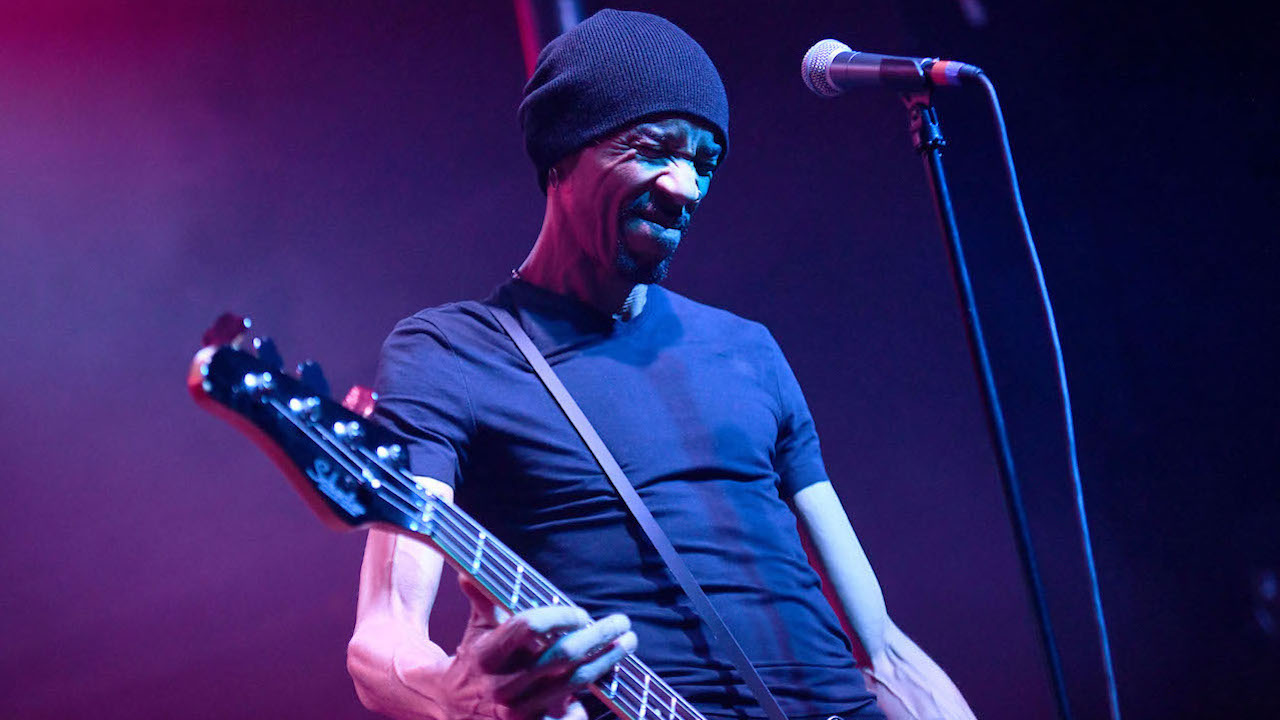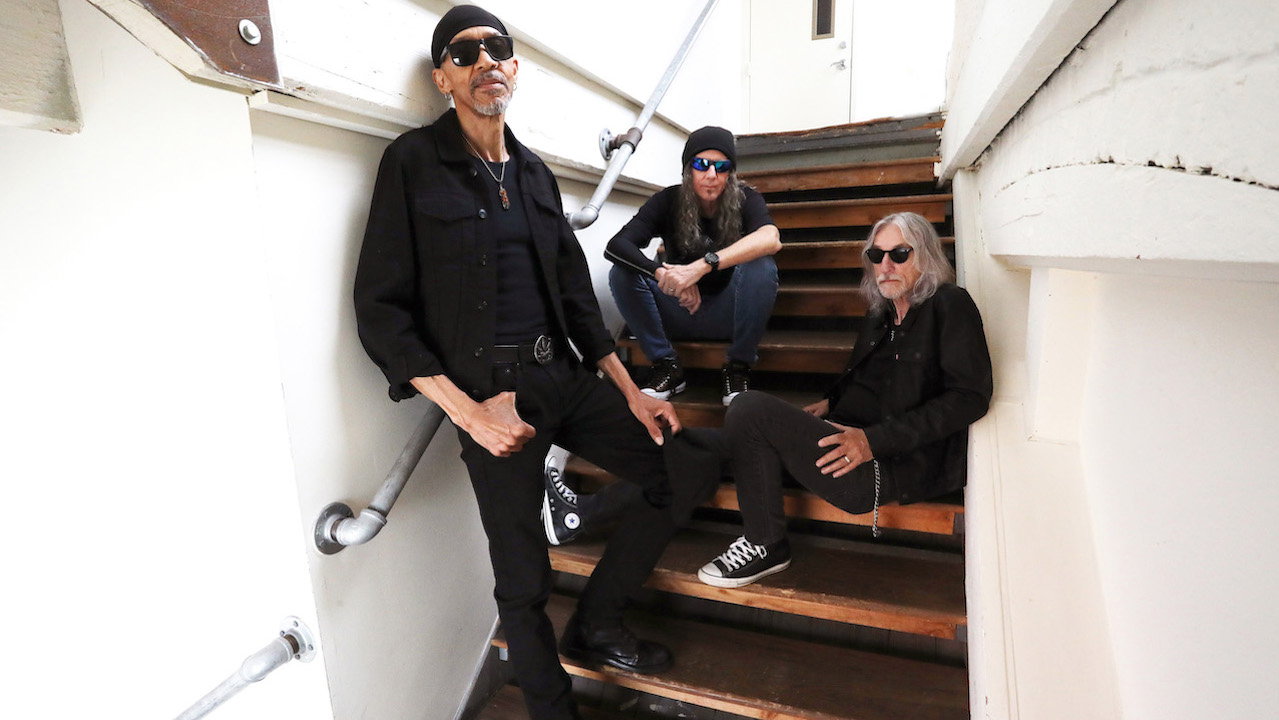Kings X leader Dug Pinnick: “My ADD meant that practising was useless...”
The golden-voiced 12-string bass master discusses unlikely brass influences, his eternal search for tone and how ADD impacted his bass playing

All the latest guitar news, interviews, lessons, reviews, deals and more, direct to your inbox!
You are now subscribed
Your newsletter sign-up was successful
Thirty-seven years into his career with Kings X, who have just released their excellent thirteenth album, Three Sides Of One, bassist and singer Dug Pinnick is at the peak of his creative powers, even though he’s 72. When we call him up to discuss his phenomenal career, he looks and sounds 30 years younger than his actual age, perhaps because – as he tells us – he’s having a blast.
Dug, Three Sides Of One is killer. Did you record it in the conventional way, or remotely?
"Thanks. We went to the studio and made an actual record. Ty [Tabor, guitar] and Jerry [Gaskill, drums] came out to LA and we rented a house for them to stay in. It took us a month, and we had a great time."
What was the gear you were using?
"The basses were my Schecter signatures and my 12-string Yamaha. The amp was an old vintage SVT and cabinet that we mic’ed up, wide open in a little room, and I used my signature pedal, the Tech21 DP-3X. Or is it the DP-X3? I’ve never been able to say it right, because I’m dyslexic. All these years it’s been out, and I still can’t remember which it is... Anyway, the pedal went straight into the board, because it’s designed to sound like it’s live, so it goes into its own channel."
That pedal sounds incredible. At Bass Player, we gave it the Effect Of The Year award in 2018.
"That’s right – and thank you. Man, what an honor that was, to get that recognition. That’s a pedal guy’s dream. In fact, I tell people about it a lot, ha ha! When Tech21 and I were trying to get my sound, the first thing we did was make a signature amp, the Dug Ultra Bass 1000, and then later on they said, ‘Let’s put it in a pedal’. It works real well with tube amps, so when we go out live I’m going to pull out some Ampeg SVTs and just put the pedal into that."

How are you changing as a bass player as the years pass?
"I think my note changes are a little different, but you know, I’m still me. I’m always behind the beat, and I’m always trying to groove and swing it. On this album, I had a lot of orchestration in my mind. When I play bass, I hear cello and baritone saxophone and tuba and a grand piano. All of those instruments are in the register that I play bass in. When I play bass, I’m actually mimicking what I would think they would play. I went to New Orleans with a friend one time, and we went to a club to see a brass band – and the tuba player was playing through an amp. Not only did it sound deep and loud, but you could hear the player’s breathing – it was like an ogre breathing! I have never, ever forgotten that."
Do you still work on improving your bass playing?
All the latest guitar news, interviews, lessons, reviews, deals and more, direct to your inbox!
"No, I stopped practicing bass after I learned how to do it in my twenties. I put every record on that I had, and played along with them until I learned every lick. Finally, I got to a point where I thought ‘I gotta do my own thing now’ but there was no band at the time to play along with, so I just played by myself and tried to write songs. But I have ADD, so by the time I got into the second verse, I was thinking about what landing on Mars must be like, so I stopped writing."

Are there are any benefits to having ADD as a bass player?
"Yeah. Because my ADD meant that practising was useless, I needed to write songs, and so I had to learn to do that. And also, because I couldn’t practice, I got into learning through repetition. To this day, I’m happiest if you give me my bass guitar, a joint and a little wine, and just let me stand in front of my rig and jam.
I’m happiest if you give me my bass, a joint and a little wine, and just let me stand in front of my rig and jam.
"I can do that all night. I’ve literally done it. I remember when I was down in New Orleans, where they’re known for partying, I played in a band at a wedding reception, and then we went to a club about three in the morning and jammed until six, when the sun was coming up. I went back to the hotel at that point, but the rest of them kept jamming. That’s New Orleans. It was crazy."
You also deliver an amazing vocal performance on the new album.
"Thank you. My voice has gotten lower as I’ve gotten older. I stopped smoking joints and switched to vapes instead, and when I did that the change was immediate. Edibles work too, so I do both when we go on the road, so that I don’t push my voice."

You had a couple of years off the road during pandemic. Was Kings X in good performing shape after that?
"Here’s the deal. We never feel like we play well. People say after we come off stage, ‘How do you feel?’ and I’ll say ‘Horrible! We sucked’. But there’s no need for them to comfort me, because this is what we do. If we felt like we were the greatest live band in the world, we wouldn’t push so hard. But no-one wants to hear that from me, so what I’ve learned is just to say ‘Thanks, that means a lot to me, and I’m glad you had a lot of fun’."
Will we see more 12-string bass playing from you?
"I’m starting to dabble more into the 12-string again. You can hear it on ‘Let It Rain’ on the new album. When I did the KXM project a few years ago, on the song ‘Noises In The Sky’, George [Lynch, ex Dokken] pulled out a 12-string guitar and started playing the riff, so I said, ‘Well, I’ll pull out my 12-string bass and see what it sounds like’. If you watch the KXM documentary on YouTube, there’s one little 10-second clip about of both the guitar and the bass in the room together with the drums. The tone that came out of it was huge, and I loved it, so I’ve been thinking about dabbling into the 12-string a little bit more."
Does the 12-string bass require extra hand strength?
"It does. I have to squeeze harder because I’m pushing three strings down at a time, and it’s a lot more work. For that reason, I’m learning to simplify my playing, because that’s way better than overplaying when you’re on a 12-string. There’s a lot of stuff you can do on that instrument that I think that we haven’t explored yet. You can hit the A string and then hit the other two A strings lightly, to get a chime harmony going. I’m really on a rampage now to start making my mark again with the 12-string."
How are the hands holding up?
"You know, my hands are fine and so is everything else. I’ve been taking physical tests, and I am so healthy, it’s stupid. According to my tests, I have the heart of a 54-year-old, even though I’m 72. I don’t get sick. Sometimes I wonder what’s going on here, because I just ain’t deteriorating."
Life is good then, Dug?
"Oh, I got no complaints any more. It seems like when you get older, especially when you get past 70, you enjoy life more. The bullshit kind of dissipates!"
Three Sides Of One by Kings X is out now on Inside Out Music.

Joel McIver was the Editor of Bass Player magazine from 2018 to 2022, having spent six years before that editing Bass Guitar magazine. A journalist with 25 years' experience in the music field, he's also the author of 35 books, a couple of bestsellers among them. He regularly appears on podcasts, radio and TV.

